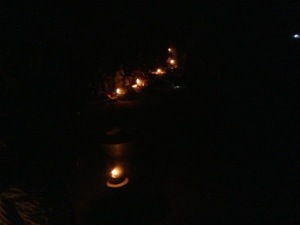Benin is a beautiful country. People take pains to dress impeccably, which makes the underlying poverty more difficult to see. 90% of the population, however, does not have access to electricity. Their houses may be ready for it, they may be ready to pay, but the infrastructure is missing. There are almost no street lights, and gas is sold from jugs on the side of the road. Even for people who are lucky enough to have electricity, the power cuts out constantly and unexpectedly, and people who rely on refrigerators to keep their goods fresh may lose their entire stock because of a power outage. The alternative to electricity is kerosene, widely used in villages and extremely dangerous. A flame left burning can easily burn down a house, and stories abound about deaths of people who could not get out. Kerosene also contributes to asthma, and other respiratory diseases. According to the World Bank, “breathing kerosene fumes is the equivalent of smoking two packets of cigarettes a day and two-thirds of adult females with lung cancer in developing nations are non-smokers” (http://www.bbc.co.uk/news/business-18262217). Burning kerosene is also inefficient and pollutes the environment.
Not having electricity cuts down the day dramatically. In Benin, where it is already often too hot to do much in the middle of the day, at least during the hot season, so much time is lost when the day ends when the sun goes down. People who could otherwise be continuing to work must stop, and children cannot study.
Solar energy is an elegant solution. It does not require any infrastructure, and based on the need, the number of lights can be scaled up or down. Some families may only need two, whereas for some eight may be better. The systems are easy to install, and last for 10 years. The light is surprisingly bright. People can suddenly work, study and socialize much more easily in the evening. Additionally, each solar home system comes with one or more phone chargers. Phones are the main form of communication in Benin. Most people do not have personal access to the Internet, and use their phones for everything from entertainment (listening to music or watching music videos) to business calls, to staying in touch. Beninese phones are always ringing, and people love to talk. Charging the phones, however, can be difficult, and may take place at communal centers via generator, or at a lucky neighbor with electricity. All in all, the lack of reliable sources of electricity and light undermines the people of Benin’s ability to realize their capabilities. Solar power provides clean, safe energy that cuts out spending on electricity bills or kerosene completely.
Author: Idun Klakegg
